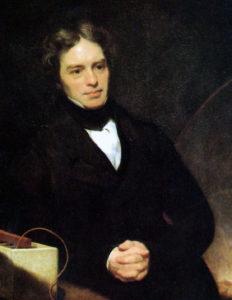This is a series of short essays on the lives of electrical engineers and those who had a major influence in the electrical engineering field be it electrical engineers or scientists. It gives their short biography and some of their memorable quotes/epithets.
This category chronicles eminent personalities had lasting influence on the electrical field (no pun intended)
MICHAEL FARADAY.

Michael Faraday
He was the son of a poor and very religious family. Michael Faraday (1791-1867) received little formal education and he was apprenticed to a bookbindery in London at the age of 14. He read many of the books brought there for binding, including the “electricity” section of the Encyclopedia Britannica and Jane Marcet’s Conversations on Chemistry (include link).He also read Isaac Watts’ The Improvement of the Mind, and he enthusiastically implemented the principles and suggestions contained therein He was among the young Londoners who pursued an interest in science by gathering to hear talks at the City Philosophical Society. One of the bookbinder’s customers gave Faraday free tickets to lectures given by Sir Humphry Davy at the Royal Institution, and after attending, Faraday conceived the goal of working for the great scientist. On the basis of Faraday’s carefully taken notes of Davy’s lectures, he was hired by Davy in 1813.As they say, the rest is history.
Michael Faraday is a key contributor to understanding of electricity and electrochemistry .He is rightly called the father of electricity and perhaps the first electrical engineers. In 1821 he succeeded in producing mechanical motion by means of a permanent magnet and an electric current-an ancestor of the electric motor. A decade later, in 1831, he converted magnetic force into electrical force, thus inventing the world’s first electrical generator. In essence he had discovered electromagnetic induction, the principle behind the electric transformer and generator. This discovery was crucial in allowing electricity to be transformed from a curiosity into a powerful new technology.
Although Faraday received little formal education, he was one of the most influential scientists in history. Many biographers describe him as “mathematically illiterate”. Faraday received only the rudiments of an education, learning to read, write, and cipher in a church Sunday school.
Quotes:
“ALL THIS IS A DREAM. Still examine it by a few experiments. Nothing is too wonderful to be true, if it be consistent with the laws of nature; and in such things as these experiment is the best test of such consistency.”
~Laboratory journal entry #10,040 (19 March 1849);
“But still try, for who knows what is possible…”
~As quoted in The Life and Letters of Faraday (1870) Vol. II
“The secret is comprised in three words — Work, finish, publish”
His well-known advice to the young William Crookes, who had asked him the secret of his success as a scientific investigator
“The important thing is to know how to take all things quietly.”
As quoted in Treasury of the Christian Faith: An Encyclopedic Handbook of the Range and Witness of Christianity (1949)
“The lecturer should give the audience full reason to believe that all his powers have been exerted for their pleasure and instruction.”
As quoted in A Random Walk in Science (1973) by Robert L. Weber, p. 76
“I shall be with Christ, and that is enough.”
Last words, answering the question “Have you ever pondered by yourself what will be your occupation in the next world?”
“I have far more confidence in the one man who works mentally and bodily at a matter than in the six who merely talk about it — and I therefore hope and am fully persuaded that you are working. Nature is our kindest friend and best critic in experimental science if we only allow her intimations to fall unbiased on our minds. Nothing is as good as an experiment which, whilst it sets an error right, gives us (as a reward for our humility in being reproved) an absolute advancement in knowledge.”
~Letter to John Tyndall (19 April 1851); letter 2411,
If you want to learn more about Michael Faraday, I highly recommend reading The Life and Letters of Michael Faraday by DR. BENCE JONES, FARADAY as A DISCOVER BY JOHN TYNDALL and MICHAEL FARADAY , Sandemanian and Scientist by Geoffrey Cantor.
Sources:
Wikiquote
Encyclopedia
